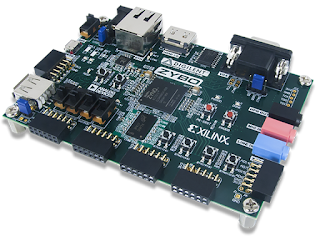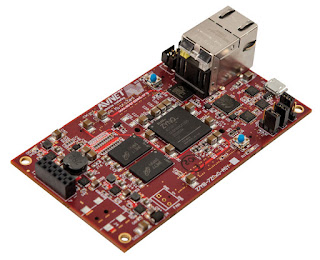I already decided to use the Xilinx Zynq SoC. I have used them before and to be honest, they have best of both worlds, which is a uC and FPGA. Also the Xilinx tool-chain is easy to use and well supported (and free). The question now is which development board should I use.
Introduction
Xilinx Zynq is an SoC with a hardcore uC built in, specifically a dual-core A9 ARM processor. |
| Xilinx Zynq Overview |
For the Zynq development boards I will be comparing, they are usually one of two versions of the Zynq SoC (low end). See below for a comparison of the Xilinx Zynq SoC for the Z-7010 and Z-7020.
 |
| Low End Zynq SoC Comparison |
My requirements are as follows:
- Cheap
- Less then $200 USD
- Available
- I don't want to wait long lead times
- Well supported
- If run into a brick wall, can I quickly go to google and find an answer or does the vendor offer customer support
- Certain specs:
- Zynq 7010 or 7020
- >= 512 MB RAM
- Gigabit Ethernet
- USB-UART controller on-board so that I can avoid external tools and dongles
- Plenty of GPIO. PMODs are a bonus, but not necessary
- USB-JTAG or JTAG header (I already have a JTAG programmer)
- Not as important, but some form of video out (VGA/HDMI)
- If some features are missing and a carrier is needed, then it must be cheap and affordable. Total cost of kit should be under $200 USD
Analysis
There exits a lot of Zynq development boards on the market that are both affordable and useful. Below I composed a table of the five most affordable/useful Zynq development boards currently on the market. Later in this post I will lists a few honorable mentions for other boards that might interest people.Some notes for the table.
- PL = Programmable Logic
- PS = Processor System
- Anything surrounded by {curly braces} are an option for that board
 |
| Zynq Development Board Comparison Table |
Zybo
The Zybo (ZYnq BOard) is a great little development board for the Zynq SoC. If you refer to the above table you can see it has everything. It's not the cheapest, but for the price it's a really good deal. I really like the ability to program the Zynq via USB, while the other boards require a programmer. If you are playing with video, then the ability to source or sink HDMI streams and a VGA port allows for some interesting experiments. Be aware though that the company states that they have only tested up to 720p. The PMOD connectors allow for easy connections to a long list of PMOD compatible boards. The board is used by Xilinxs XUP program; therefore, there's a good deal of examples and documentation on the board. Aside from development/research use, the Zybo is pretty limited (you would never use this thing in production).Some useful links:
Zybo - Digilent Main Product Page
Zybo - Digilent Reference Material
Zybo - Xilinx XUP (Xilinx University Program) Workshops
(If you click on each workshop with Zybo listed you can download lab docs/sources for experiments. The presentation/learning material is restricted to professors teaching the material)
Microzed
The Microzed board is by far the most popular development/SOM/SBC board out there today. It has been around for a while and has seen a few revisions, so you know all the bugs have been worked out by now and is running optimally. There's no video or audio support, but with the large amount of extra IO you can easily add your own carrier board if you needed that ability. If I ever had a design that required a Zynq and had a lot of custom peripherals, then I would go with a Microzed SOM or SBC and make my own carrier card. The SBC version is basically the same as the SOM but optimized for embedded environments where the SBC is the motherboard, while the SOM boards are more like a daughter board. If you have a product meant to go into production then this is your board hands down. They have commercial and industrial temp range, cost optimized, and available in Z7010/Z7020 versions. See below for more info on the different board types.** As for today (Sept 2016) only the Z7010 evaluation Kit, Z7010 SOM, and Z7020 cost optimized boards are in stock, everything else is 8 weeks lead-time.
Some useful links:
Microzed SOM - Main Page
Snickerdoddle
Now this bad boy is actually my favorite board. It's packed with goodies and stupid cheap. The only missing thing is a Ethernet connection, but it has WiFi and Bluetooth, They have a carrier card (piSmasher SBC) for only $59, not bad! I actually wanted to get one of these boards a couple of months ago, but being that it is currently running a crowd sourcing campaign, they ran into some production delays (trust me there's always delays when you move into production) and so I didn't want to keep waiting, too much of a tease. I may get one of these later down the road.** One Sep 19, krtlk announced pricing increases starting Oct 1. If you want one of these I would act now!
Some useful links:
krtkl - Main Page
Snickerdodle crowd-sourcing campaign
Z-Turn
This is a very capable little board. In fact it has everything I could ask for. The only issue I have is that I don't think anyone uses it??? It is coming from China, so it's most likely more popular there then in North America. The shipping is kind of high at $35 USD and will probably take a while. I'll pass on this one and wait for a Snickerdoodle Black.
Some useful links:
Z-Turn - Main Page
Z-Turn - Main Page
Parallella
This boards real attraction is that it has a 16 core co-processor on board in addition to the Zynq. Aside from the co-processor it has the basics, nothing too fancy. I would have liked a USB-UART controller rather then having to use a external one to plug into the UART header. Also no JTAG header (have to use expansion header). Lots of support with this board and is popular (you can buy it at Digikey and Amazon). If you need the 16-core co-processor then this is your board.
Some useful links:
Parallella - Main Page
Parallella - Main Page
Honorable Mentions
Although the following development boards did not make my list above, I did come upon some really neat boards during my research that I feel should be mentioned., The main reason I didn't include the following boards above is because they are over my $200 price range or hard to get (I live in Canada and most are from Europe), but depending on your needs they be the right board.
Conclusion
All this data and researching has now brought me to making a choice (the hardest part). The board that meets most of my requirements (see intro) is the Zybo. I personally _really_ want the Snickerdoodle Black. Once you add the piSmasher SBC carrier, it truly becomes an awesome board. Unfortunately I got impatient waiting for production (does not meet my availability requirement) so I'll pass for now. There's a very good chance I will pick one up once they are producing these on the regular.If it ever came down to making a production ready design, I would have gone with the MicroZed. It's a great SOM board that has everything needed for the brain of a system. Add a custom designed carrier board for your application and your off. But my requirements at the moment are more of a developing platform and so the Zybo is my choice.






No comments:
Post a Comment